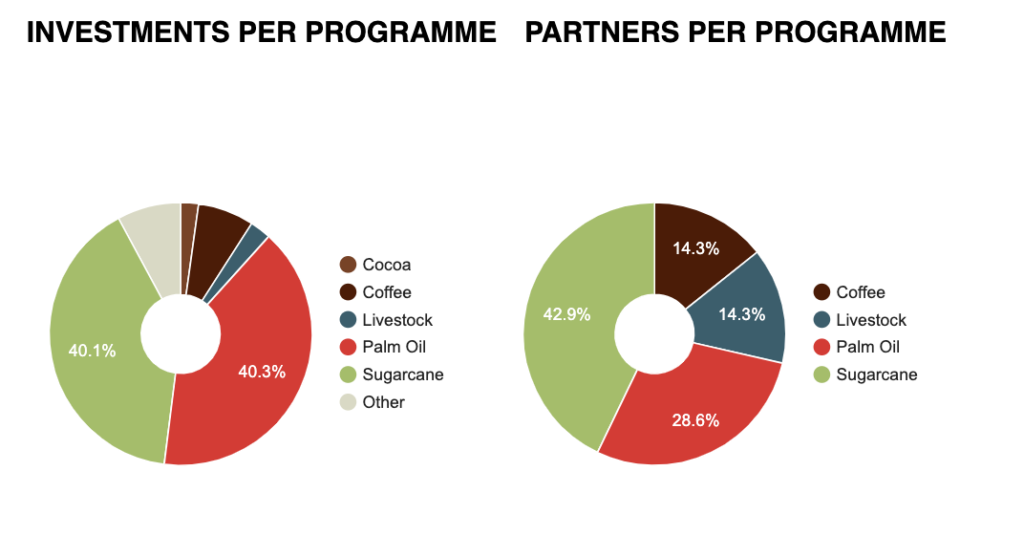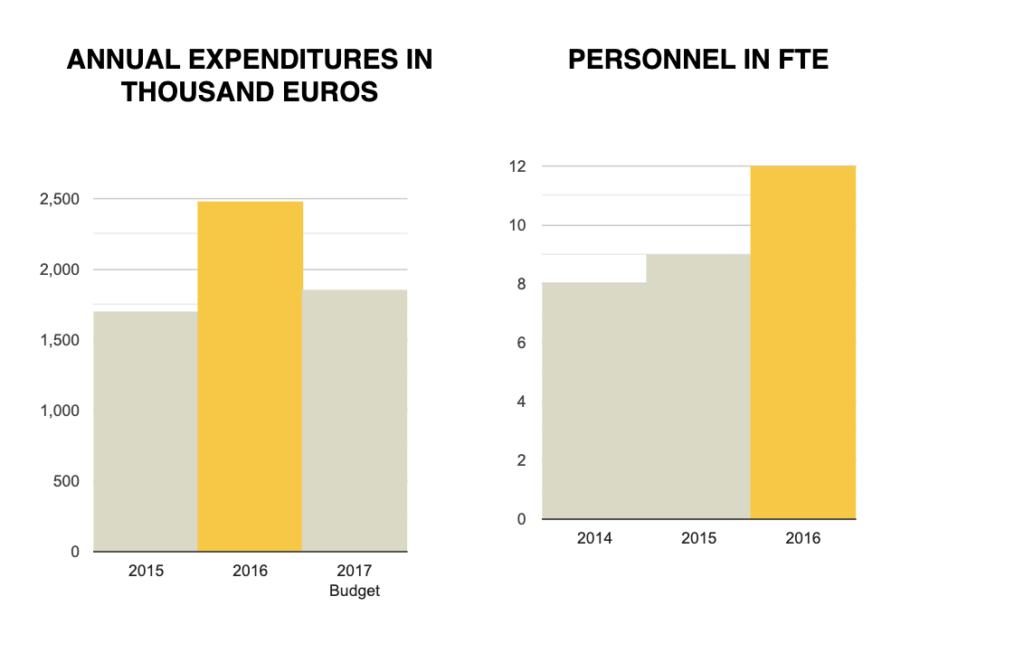REGIONAL COMMODITY PROGRAMMES
Solidaridad focused on addressing the challenge of low investment in production at the landscape level as well as women’s involvement in agroecology. It led efforts to replace oil palm with cocoa-centric agroforestry systems to improve soil conservation and carbon enhancement. Solidaridad also conducted a baseline assessment of cocoa smallholders to develop smallholder-inclusive and diverse production models within the landscape that focus on improved productivity, income, climate resilience and market access.

In 2016, Solidaridad concluded the Bringing Agriculture, Carbon and Knowledge (BACK) to REDD+ coffee programme in Chiapas, Mexico. This effort resulted in the development of a validated technological package that accelerates coffee rehabilitation and renovation. It achieves this by introducing leaf rust resistant varieties with proven cup quality for market access, and intensifying and diversifying production systems. This, in turn, leads to increased income, food security, farmer efficiency and resilience.

The rapid expansion of palm oil and livestock production systems are driving deforestation and the acceleration of environmental degradation in the eastern part of Nicaragua. Solidaridad is working with the livestock community to promote sustainability and set up a platform for livestock sustainability.

Solidaridad launched the Mesoamerican Palm Oil Alliance (MAPA), a regional multi-stakeholder platform working to accelerate the implementation of RSPO best practices and facilitate an effective policy environment in Mexico, Guatemala, Honduras and Nicaragua. In Honduras, Solidaridad continued to lead the Sustainable Honduran Palm Oil Project (PASH), which includes 10 companies representing 80% of Honduran palm oil production, as well as 11,000 families of palm oil producers and workers.

Under the PanAmericaña programme, Solidaridad co-convened the Mexico Working Summit in partnership with Bonsucro and CNIAA (Mexican National Chamber for Sugar and Alcohol Industries). The event generated intense interest in collaboration and participation among key stakeholders. The platform continued to gain traction throughout the year, with interest in expanding the platform to Guatemala, El Salvador, Honduras, Nicaragua, Haiti and Dominican Republic.

DEVELOPMENTS
Two regional learning and exchange platforms launched in 2016 and experienced rapid growth with the participation of supply chain actors from all countries in the region. The MesoAmerican Palm Oil Alliance (MAPA), a sustainable palm oil platform, and PanAmericaña (PanAm), a sustainable sugar platform, share the following characteristics:
- Scale and speed: MAPA and PanAm incorporate knowledge in platforms for producer-to-producer exchanges at both national and regional levels, as well as knowledge exchange via virtual platforms (to launch Q2 2017). These will function as information and learning centres for mills, extraction plants and producers to close the gaps between Bonsucro and RSPO certification. The platforms also extend efforts to the continental level with respect to sharing tools and implementing best practices and innovations beyond Mesoamerica.
- Both initiatives are characterized by heavy market involvement.
- With unparalleled high levels of industry participation, Mesoamerica has the potential for recognition as the “go-to region” for sustainably-produced palm oil and sugar.
The groundwork was laid to build regional coffee, cocoa and livestock learning and exchange platforms for launch in 2017.
In addition, Solidaridad’s work moved beyond industry and farm with the launch of two sustainable landscapes initiatives in the Zona Litoral del Norte in Honduras, and Region Autonomo del Caribe Sur in Nicaragua.

ACHIEVEMENTS
PanAmericaña private sector participation grew from 2 to 17 mills in 2016, with numerous other organizations such as CNIAA, CNC, CNPR and regional sugar associations displaying a keen interest in joining this unprecedented initiative in the region.
After four years of engagement with the Honduran and Guatemala palm oil sector, MAPA grew to include 100% of the Nicaraguan palm oil sector and a significant portion of the Mexican sector. A particular focus on establishing farmer field schools, and achieving economy of scale through the Paisajes Sostenbiles (PaSos) initiative in Northern Honduras, show great promise for bolstering improvement and sustainability of smallholder productivity, as well as bridging the RSPO certification gap.
The launch of PaSos is driving progress and national commitment to a jurisdictional RSPO certification approach in Honduras and Nicaragua, and is generating new opportunities for blended finance and impact investment for inclusive supply chains in palm oil, livestock and cocoa.
A comprehensive gender analysis of multiple supply chains (sugar, palm oil, livestock, cocoa and coffee) across the región was conducted in 2016. The in-depth assessment created the foundation for the development of training programmes and the design of interventions to integrate gender equity policies and practices for all of Solidaridad’s private sector and producer organization partners.

PARTNERSHIPS
Solidaridad continued to grow in collaboration with industry, producer associations and other stakeholders such as government, research institutions, chambers of commerce and civil society organizations. Solidaridad also maintained strategic partnerships with WWF and SNV. An exciting new partnership with EcoAgriculture Partners will transfer knowledge and tools on integrated landscapes to our regional programmes, while contributing to a growing body of research on socio-economic and environmental impacts of a landscape approach.
The Dutch Ministry of Foreign Affairs continues to be the most important donor in the region, and Solidaridad is working with the embassy to strengthen collaboration amongst the 12 strategic partners under the Dutch ministry’s “Dialogue and Dissent” strategy.
Led by Henkel’s robust investment in MAPA, other market actors are joining forces with Solidaridad to accelerate sector transformation. Coca-Cola, Pepsico and Mars demonstrated an intense interest in PanAmericaña, while Starbucks and Louis Dreyfus will support the scaling up of Solidaridad’s climate-smart coffee programme in Mexico with expected replication across the región.
Increasingly, Solidaridad is a sought-after partner due to its unique supply chain focus that spans five strategic dimensions of development: producer support for best practice implementation, robust infrastructure for scale and speed, sustainable landscapes for multiple benefits beyond the farm, national level for policy influencing, and the market for incentives and investment.
ORGANIZATION
Solidaridad established a formal legal presence in Honduras and advanced with a legal presence in Nicaragua and Mexico. In response to growing demand, several new members were brought into the regional team for programme management, development and communications, and to bring industry-insider expertise to both MAPA and PanAmericaña. The growth curve will continue into 2017 with an expected increase from eight staff members in early 2016 to 24 by mid-2017.
In October 2016, the Central American and Mexican team hosted Solidaridad’s bi-annual Executive Board of Directors meeting in Antigua, Guatemala. In addition to a learning journey to the Las Palmas on the south coast, regional partners gathered to share insights at the “Change that Matters: Innovation and Sustainability in Mesoamerica”. Speakers included Ambassador Peter-Derrek Hof, of the Dutch embassy in Costa Rica, Jorge Quezada, MARN El Salvador, Sara Scherr, EcoAgriculture Partners, Bernardo Roehrs, Agroamerica-Guatemala, Max Camiro, CNIAA, and Nico Roozen, Solidaridad’s executive director.
Team meetings in 2016 focused on 2016-2020 regional strategies for integrated and synergistic programming, and a three-day workshop on sustainable landscapes with EcoAgriculture Partners. As always, the meetings provide a great opportunity for team building and knowledge sharing.
Total income in 2016 was €1,739,993. Primary donors were the Dutch Postcode Lottery and the Dutch Ministry of Foreign Affairs.
